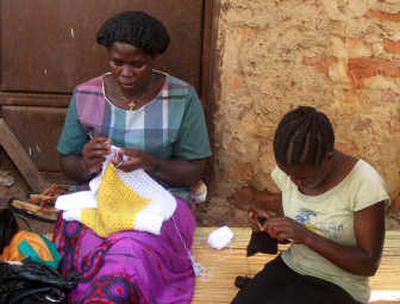Helpers with hats

GULU, Uganda – Teddy Alanyo holds more responsibility than the average 21-year-old. After HIV killed both of Alanyo’s parents when she was 16, the northern Ugandan native was left to provide both food and shelter, and pay mandatory school fees for her four younger siblings.
Luckily, Alanyo and nine other Ugandan women are able to earn a decent wage by crocheting hats in the northern town of Gulu. The women are employed by Krochet Kids International, an American nonprofit started by three 22-year-old Spokane natives, Kohl Crecelius, Travis Hartanov and Stewart Ramsey.
“For me, I like crocheting,” Alanyo said. “(Krochet Kids) is the best thing to happen to me.”
Krochet Kids originally started at Mt. Spokane High School when Crecelius, Hartanov and Ramsey crocheted large volumes of beanies in their spare time to sell to friends and families, Crecelius said via e-mail.
They saved most of the money they earned in high school, and turned the program international their second year of college after seeing “hurting” areas of the world.
“KKI was an extension of our dream and vision to help make a difference in the lives of people in need,” said Crecelius, now a senior at the University of Washington. “We married our desire to help with our passion to crochet to create this … organization called Krochet Kids International.”
And all three plan to pursue Krochet Kids post-graduation this spring. Hartanov, now a senior at Whitworth University, and Ramsey, who attends Vanguard University in Orange County, Calif., plan to return to Africa.
“It’s been tough to balance our time with school and all our other activities, so we look forward to investing more of ourselves into this cause we really believe in,” Crecelius said.
In northern Uganda, a volatile region struck by and reeling from a civil war more than 20 years old, unemployment and poverty are rampant. The UN Office for the Coordination of Humanitarian Affairs estimated nearly 1.6 million people have been displaced in three northern districts. The Ugandan program originated in June 2007 when 22-year-old Nic Lauten, a northern California native and classmate of Ramsey’s, headed to Gulu to help out. By September, Krochet Kids found 10 women from the Gulu area it wanted to help, Lauten said. By November, a full-fledged crochet business boomed.
Today, all 10 women work five days a week, weaving together 115 hats per week and earning the approximate salary of a Ugandan primary school teacher. About 1,100 to 1,200 hats have been crocheted since November.
Crecelius said the greatest achievement thus far was receiving their first shipment of 329 hats from Uganda because “it signified the feasibility of a once distant and abstract vision.”
After creation, the hats are shipped to the United States, where the Spokane founders and other college friends sell and promote them. They’re hoping to begin selling them online, too, Lauten said.
Cindrella Anena, 19, is one of the women who crochets daily in Gulu. Anena, a northern Ugandan native, was orphaned last year when her mother died from HIV. Her father died from the same virus in 2001. Being the oldest of five, Anena fell into position to care for her siblings.
“Krochet Kids has helped me get money for survival,” she said.
More than seven months after the program started in full swing, Lauten said Krochet Kids in Uganda has reached about 25 percent of its goals.
Those goals include starting an educational program for northern Ugandan residents and helping the women learn how to budget with a finance program.
“Ultimately we want to help pull people out of poverty, and not just in Uganda but in developing areas (and) nations all over our world,” Crecelius said. “On a small scale, we are moving in the right direction toward our goals, however the vision and overall plan of reaching out in greater capacities. We are only at the tip of the iceberg. We have a lot of work to do.”